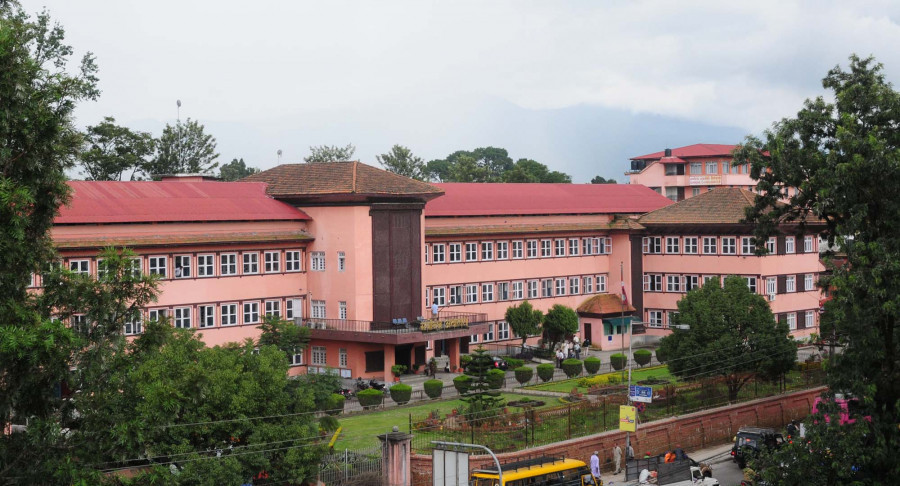Columns
Entirely over to the judiciary
As politicians go beserk for power, there is no alternative to nuanced judicial activism.
Achyut Wagle
On June 4, Prime Minister KP Sharma Oli reshuffled the federal council of ministers for the eighteenth time in the span of his forty months in power. But the latest one is drastic and largely unbecoming, at least in the political scheme of things. It is drastic in several ways. The prime minister has given ten ministerial berths to a vertically divided faction of the Janata Samajwadi Party (JSP) headed by Mahanta Thakur that barely commanded the support of, at most, eighteen members of the now-dissolved House of Representatives.
Even in the event of the reinstatement of the House, dissolved for the second time by Oli, the Oli-Thakur alliance will hardly have any meaningful impact arithmetically until Oli can woo back the warring faction within his own party. As Oli rapidly ceases to enjoy political support from within the country, the general prognosis is that, by inducting the JSP splinter and awarding it a disproportionately larger share in the government compared to its actual political weight, he is trying instead to wield geopolitical muscle by exploiting the fact that the current Indian establishment favours the Mahanta faction.
Constitutional and ethical considerations apart, Oli at present is only a caretaker prime minister as Parliament stands dissolved and the dates for parliamentary elections have been already announced. Beyond managing the day-to-day administration of the country, ideally, he is not even allowed to appoint or transfer public servants in a manner to impact electoral outcomes. But he has rampantly indulged in making new political alliances and appointing new ministers at the expense of the taxpayers’ money.
A mindset of state capture
Oli has already completed a sort of state capture by redefining the decision process in the Constitutional Council that appoints the office-bearers of all constitutional bodies (including the Election Commission) and, by now, has filled with his henchmen in almost all of them. As such, the regulatory teeth of those critical institutions have been blunted—leaving Oli essentially rein-free for his megalomania-driven political misadventures.
In parallel, Oli has issued and reissued several critical ordinances with malafide intentions of reinforcing his position. The widely debated Citizenship Ordinance is one of them. He is not only alleged to have deliberately compromised many constitutional provisions but also indulged in policy corruption to favour crony capitalists. For example, the policy of opening the export of mine and quarry based construction materials; ostensibly ignoring the fragile Chure Hills ecosystem has already angered many.
In a nutshell, Oli has acted in clear detriment to democratic norms, violated or evaded important constitutional and parliamentary processes, enacted distorted laws and ordinances to suit his personal political ambitions and introduced policies that are clearly against the interest of the nation. And, unfortunately, no state mechanism or institution except for the country's judiciary seems to be left to effectively function out of the draconian shadow of Oli's dictatorial ambitions.
Judicial hopes
The resultant effect is that lawyers and petitioners are compelled to file hundreds of lawsuits in the court of law, mainly in the Supreme Court, seeking remedies to all kinds of maladies and aberrations brought about by the government. They range from setting potentially novel principles through the interpretation of related constitutional provisions, reinstatement of the dissolved House, mandamus in favour of opposition coalition to form a new government, annulment of the Citizenship Ordinance to issue an order to scrap the proposed policy of exporting mine-based construction materials.
This indeed has put unprecedented pressure on, and, at the same time, provided a historical opportunity for the country's judiciary to prove its mettle and impartiality. In the given scenario, it would not be an exaggeration to state that the entire responsibility of putting derailed constitution back on track, saving the constitution and federal democratic system and also correcting the government policies that are against the national interest falls upon the judiciary. To enter and then deliver a verdict on such politically sensitive and trend-setting issues certainly requires an equally unprecedented scale of judicial activism, of course, with a due sense of inherent responsibility.
The public expectation from the judiciary in these critical times remains rather bullish. There is a reason for this optimism. Nepal's judiciary, even during binding political constraints in history, has not generally disappointed the nation. The February 22 verdict to reinstate Parliament is a recent example of that. Several verdicts related to saving the public from the Covid-19 pandemic and in the interest of the federal polity, among others, were admonishing and often innovative. The incumbent Chief Justice Cholendra Shumsher Rana, despite many critics of his style of functioning, has set a record of historically bold single bench verdict by staying the impeachment motion mooted in parliament against the then Chief Justice Sushila Karki and her reinstatement to work when he was a justice in the apex court. Besides, for any justice now in the Supreme Court, and in the Constitutional Bench, it may be a lifetime opportunity to contribute to save the country's disarrayed constitutionalism, thus, enhances the general optimism.
Of course, in the principles of jurisprudence, the preference over judicial activism as against judicial restraint is an unsettled debate. In well-functioning democracies, judicial activism on overarching political issues is not considered desirable. But in fledgling democracies like Nepal where no new constitution was ever allowed to extend its root to institutionalise democracy, and where the majority of political players still are ideologically anti-democrats, the judiciary as the most trusted institution also has a role to inculcate the idea of the rule of law among the political players of the country. Once an ambience is created for politics that can be left to responsible political hands, judicial restraint may be enough to govern the country. But for now, there is no alternative to nuanced judicial activism.




 8.26°C Kathmandu
8.26°C Kathmandu















